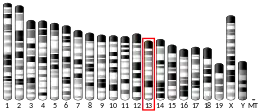Disco interacting protein 2 homolog c
Disco interacting protein 2 homolog C is a protein that in humans is encoded by the DIP2C gene. [5]
| DIP2C | |||||||||||||||||||||||||||||||||||||||||||||||||||
|---|---|---|---|---|---|---|---|---|---|---|---|---|---|---|---|---|---|---|---|---|---|---|---|---|---|---|---|---|---|---|---|---|---|---|---|---|---|---|---|---|---|---|---|---|---|---|---|---|---|---|---|
| Identifiers | |||||||||||||||||||||||||||||||||||||||||||||||||||
| Aliases | DIP2C, KIAA0934, disco interacting protein 2 homolog C | ||||||||||||||||||||||||||||||||||||||||||||||||||
| External IDs | OMIM: 611380 MGI: 1920179 HomoloGene: 40996 GeneCards: DIP2C | ||||||||||||||||||||||||||||||||||||||||||||||||||
| |||||||||||||||||||||||||||||||||||||||||||||||||||
| |||||||||||||||||||||||||||||||||||||||||||||||||||
| |||||||||||||||||||||||||||||||||||||||||||||||||||
| |||||||||||||||||||||||||||||||||||||||||||||||||||
| |||||||||||||||||||||||||||||||||||||||||||||||||||
| Wikidata | |||||||||||||||||||||||||||||||||||||||||||||||||||
| |||||||||||||||||||||||||||||||||||||||||||||||||||
Function
This gene encodes a member of the disco-interacting protein homolog 2 family. The protein shares strong similarity with a Drosophila protein which interacts with the transcription factor disco and is expressed in the nervous system. [provided by RefSeq, Oct 2008].
References
- GRCh38: Ensembl release 89: ENSG00000151240 - Ensembl, May 2017
- GRCm38: Ensembl release 89: ENSMUSG00000048264 - Ensembl, May 2017
- "Human PubMed Reference:". National Center for Biotechnology Information, U.S. National Library of Medicine.
- "Mouse PubMed Reference:". National Center for Biotechnology Information, U.S. National Library of Medicine.
- "Entrez Gene: Disco interacting protein 2 homolog C". Retrieved 2018-07-26.
Further reading
- Mukhopadhyay M, Pelka P, DeSousa D, Kablar B, Schindler A, Rudnicki MA, Campos AR (June 2002). "Cloning, genomic organization and expression pattern of a novel Drosophila gene, the disco-interacting protein 2 (dip2), and its murine homolog". Gene. 293 (1–2): 59–65. doi:10.1016/s0378-1119(02)00694-7. PMID 12137943.
- Oguri M, Kato K, Yokoi K, Yoshida T, Watanabe S, Metoki N, Yoshida H, Satoh K, Aoyagi Y, Nozawa Y, Yamada Y (January 2010). "Assessment of a polymorphism of SDK1 with hypertension in Japanese Individuals". Am. J. Hypertens. 23 (1): 70–7. doi:10.1038/ajh.2009.190. PMID 19851296.
- Talmud PJ, Drenos F, Shah S, Shah T, Palmen J, Verzilli C, Gaunt TR, Pallas J, Lovering R, Li K, Casas JP, Sofat R, Kumari M, Rodriguez S, Johnson T, Newhouse SJ, Dominiczak A, Samani NJ, Caulfield M, Sever P, Stanton A, Shields DC, Padmanabhan S, Melander O, Hastie C, Delles C, Ebrahim S, Marmot MG, Smith GD, Lawlor DA, Munroe PB, Day IN, Kivimaki M, Whittaker J, Humphries SE, Hingorani AD (November 2009). "Gene-centric association signals for lipids and apolipoproteins identified via the HumanCVD BeadChip". Am. J. Hum. Genet. 85 (5): 628–42. doi:10.1016/j.ajhg.2009.10.014. PMC 2775832. PMID 19913121.
- Yoshida T, Kato K, Yokoi K, Oguri M, Watanabe S, Metoki N, Yoshida H, Satoh K, Aoyagi Y, Nozawa Y, Yamada Y (April 2010). "Association of genetic variants with hemorrhagic stroke in Japanese individuals". Int. J. Mol. Med. 25 (4): 649–56. doi:10.3892/ijmm_00000388. PMID 20198315.
- Rose JE, Behm FM, Drgon T, Johnson C, Uhl GR (2010). "Personalized smoking cessation: interactions between nicotine dose, dependence and quit-success genotype score". Mol. Med. 16 (7–8): 247–53. doi:10.2119/molmed.2009.00159. PMC 2896464. PMID 20379614.
- Bailey SD, Xie C, Do R, Montpetit A, Diaz R, Mohan V, Keavney B, Yusuf S, Gerstein HC, Engert JC, Anand S (October 2010). "Variation at the NFATC2 locus increases the risk of thiazolidinedione-induced edema in the Diabetes REduction Assessment with ramipril and rosiglitazone Medication (DREAM) study". Diabetes Care. 33 (10): 2250–3. doi:10.2337/dc10-0452. PMC 2945168. PMID 20628086.
- Li WD, Jiao H, Wang K, Zhang CK, Glessner JT, Grant SF, Zhao H, Hakonarson H, Arlen Price R (September 2013). "A genome wide association study of plasma uric acid levels in obese cases and never-overweight controls". Obesity (Silver Spring). 21 (9): E490–4. doi:10.1002/oby.20303. PMC 3762924. PMID 23703922.
This article incorporates text from the United States National Library of Medicine, which is in the public domain.
This article is issued from Wikipedia. The text is licensed under Creative Commons - Attribution - Sharealike. Additional terms may apply for the media files.



